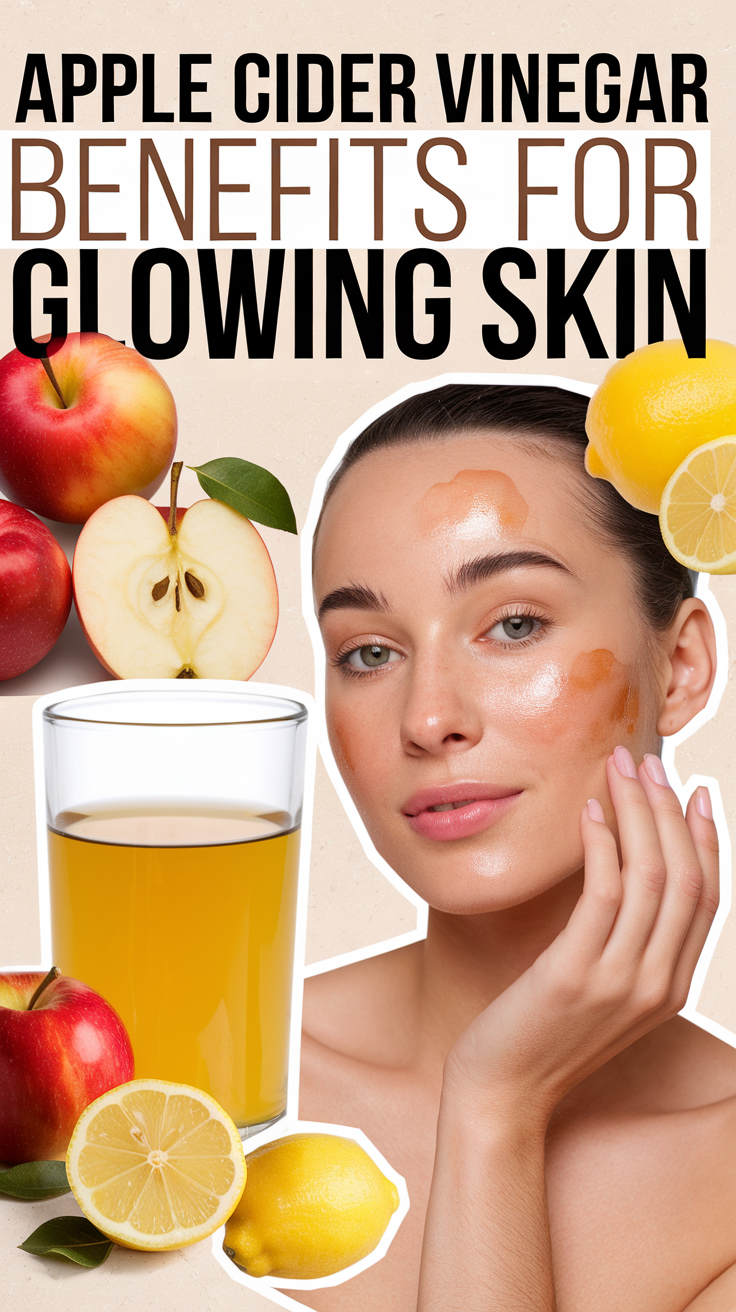Apple Cider Vinegar Benefits for Glowing Skin
Apple cider vinegar (ACV) can greatly enhance your skin’s glow by balancing pH levels and improving hydration. Its alpha-hydroxy acids naturally exfoliate, removing dead skin cells for a brighter complexion. Additionally, ACV’s antibacterial properties help fight acne-causing bacteria, reducing blemishes and inflammation. By strengthening the moisture barrier, it locks in hydration and promotes a plump appearance. To use, dilute ACV with water and apply it as a toner. Consistent application leads to healthier skin and a radiant glow, and there are even more ways to maximize ACV’s benefits.
Key Takeaways
- Balances skin pH, enhancing hydration and preventing moisture loss for a plump, radiant appearance.
- Contains alpha-hydroxy acids (AHAs) that promote exfoliation, revealing brighter and more even-toned skin.
- Exhibits antibacterial properties that help combat acne-causing bacteria, reducing inflammation and promoting clearer skin.
- Strengthens moisture barriers, locking in hydration and improving skin texture for a luminous glow.
- Stimulates blood flow to skin cells, supporting overall skin health and enhancing natural radiance.
Balancing Skin Ph Levels
When it comes to achieving healthy skin, balancing your skin’s pH levels is essential. Your skin’s pH typically ranges from 4.5 to 5.5, classifying it as slightly acidic. This acidity helps maintain the skin barrier, preventing moisture loss and protecting against harmful bacteria.
When you disrupt this balance, whether through harsh skin care products or environmental factors, you may experience issues like dryness, irritation, or acne.
Incorporating products that help restore your skin’s pH can considerably improve its health. Apple cider vinegar, for instance, is known for its ability to lower pH levels, making it an excellent addition to your skin care routine.
When diluted correctly, it can help bring your skin back to its natural state, enhancing its overall appearance and function.
Always remember, though, that moderation is key. Overuse of acidic products can lead to further imbalance. By monitoring your skin’s response, you can effectively use apple cider vinegar to promote a healthy pH and achieve glowing skin.
Prioritizing pH balance in your skin care regimen won’t only enhance your skin’s health but also its resilience against external aggressors.
Natural Exfoliant Properties
Maintaining balanced pH levels not only supports your skin barrier but also sets the stage for effective exfoliation. Apple cider vinegar (ACV) contains a unique chemical composition rich in alpha-hydroxy acids (AHAs), particularly acetic acid. These AHAs work to gently dissolve dead skin cells, revealing a brighter and smoother complexion.
The natural exfoliant properties of ACV make it an excellent choice for those seeking to enhance skin texture without harsh treatments.
While AHAs are beneficial, it’s crucial to take into account your skin sensitivity. ACV’s acidity can be potent, leading to irritation if used excessively or on sensitive skin. To minimize any adverse reactions, it’s advisable to dilute ACV with water before application. This dilution helps maintain the efficacy of its exfoliating properties while reducing the risk of skin discomfort.
Incorporating ACV into your skincare routine can help promote cell turnover and improve overall skin appearance. As you explore its benefits, remember to listen to your skin and adjust usage based on how it reacts.
With a careful approach, you can harness the natural exfoliant properties of apple cider vinegar for a glowing complexion.
Antibacterial Benefits
Apple cider vinegar (ACV) offers significant antibacterial benefits that can help keep your skin clear and healthy. Its potent antibacterial properties stem from the acetic acid and other organic compounds present in ACV, which work to combat harmful bacteria on your skin. This is vital for maintaining a balanced skin microbiome, as an imbalance can lead to various skin issues.
When you incorporate ACV into your skincare routine, you’re fundamentally using a natural acne treatment. Studies have shown that the antibacterial effects of ACV can inhibit the growth of acne-causing bacteria, reducing the likelihood of breakouts. By applying diluted ACV to your skin, you create an environment that’s less hospitable to these bacteria, promoting clearer skin over time.
Moreover, these antibacterial properties can also help alleviate inflammation and redness associated with acne. By targeting the underlying causes of infection and irritation, ACV not only helps clear existing blemishes but also prevents future outbreaks.
Reducing Acne and Blemishes
Apple cider vinegar’s natural antimicrobial properties can greatly help in reducing acne and blemishes on your skin.
By balancing your skin’s pH and promoting exfoliation, it encourages skin renewal, leading to a clearer complexion.
Incorporating this ingredient into your skincare routine may enhance your overall skin health and appearance.
Natural Antimicrobial Properties
Many people struggle with acne and blemishes, often seeking effective solutions that won’t irritate their skin. One powerful ally in this battle is apple cider vinegar, known for its natural antimicrobial properties. Its antimicrobial effects help combat the bacteria responsible for acne, reducing inflammation and promoting clearer skin.
When you apply apple cider vinegar topically, its active compounds, particularly acetic acid, work to inhibit the growth of harmful microorganisms. This action not only helps in reducing existing blemishes but also prevents future breakouts, offering you a proactive approach to skin protection.
Additionally, its antifungal properties can assist in addressing various skin concerns that may arise due to yeast or mold.
Incorporating apple cider vinegar into your skincare routine can be as simple as diluting it with water and using it as a toner. This method allows you to enjoy the antimicrobial benefits while maintaining skin balance.
Remember to patch-test first to guarantee your skin responds well. With consistent use, you can experience the dual benefits of clearer skin and enhanced protection against acne-causing agents. Embrace the power of nature for a healthier, glowing complexion!
Ph Balancing Effect
Maintaining the skin’s pH balance is vital for preventing acne and blemishes, and apple cider vinegar can play a significant role in this process. The skin’s natural pH is slightly acidic, typically ranging from 4.5 to 5.5. When this balance is disrupted, it can lead to an overgrowth of harmful bacteria and compromise the skin barrier, resulting in breakouts. Apple cider vinegar, with its acetic acid content, aids in pH regulation.
When you apply diluted apple cider vinegar to your skin, it helps restore the ideal acidity level, which is important for keeping harmful bacteria at bay. This restoration not only supports a healthy skin barrier but also enhances your skin’s overall appearance.
By improving the skin’s pH balance, apple cider vinegar helps minimize excess oil production, a common contributor to acne formation.
Incorporating apple cider vinegar into your skincare routine can be a beneficial step toward clearer skin. Just remember to dilute it properly and conduct a patch test first to avoid irritation.
With consistent use, you’ll likely notice a reduction in blemishes and a healthier, more balanced complexion.
Exfoliation and Skin Renewal
While achieving a clear complexion may feel challenging, incorporating apple cider vinegar into your exfoliation routine can greatly enhance skin renewal and reduce acne and blemishes. This natural remedy contains alpha hydroxy acids (AHAs) that promote cellular turnover, helping to slough away dead skin cells and reveal fresher skin underneath.
When you apply apple cider vinegar, its acidic properties can improve your skin texture by unclogging pores and preventing the buildup of excess oil, which often leads to breakouts.
Regular use can also balance your skin’s pH, creating an environment less conducive to acne-causing bacteria.
To effectively incorporate apple cider vinegar, mix one part vinegar with three parts water and apply it to your face using a cotton ball. Allow it to sit for a few minutes before rinsing.
You should start with a patch test to verify your skin tolerates the acidity well.
Hydration and Moisture Retention
Apple cider vinegar can markedly enhance your skin’s hydration by balancing its pH levels.
This adjustment not only helps in attracting moisture but also boosts moisture retention, ensuring your skin remains plump and radiant.
Incorporating apple cider vinegar into your skincare routine could be a simple yet effective way to achieve lasting hydration.
Enhances Skin Hydration
Hydration is essential for achieving radiant skin, and apple cider vinegar (ACV) plays a significant role in enhancing moisture retention. Its unique composition includes acetic acid, which helps balance your skin’s pH levels. Maintaining a balanced pH is vital because it supports your skin’s natural barrier, aiding in moisture retention and preventing dehydration.
When you integrate ACV into your skincare routine, it serves as an effective hydration technique. You can dilute it with water and apply it as a toner, creating an environment that promotes better absorption of other skincare products. This moisture-boosting effect not only makes your skin feel more hydrated but also enhances its overall texture and appearance.
Additionally, the antimicrobial properties of ACV can help keep your skin clear and healthy, reducing the likelihood of dryness caused by breakouts or irritation.
By utilizing ACV regularly, you can develop a consistent approach to skincare that prioritizes hydration, leading to a more luminous complexion.
Boosts Moisture Retention
Moisture retention is essential for maintaining plump, healthy skin, and apple cider vinegar (ACV) greatly contributes to this aspect of skincare. One of the key functions of ACV is its ability to enhance moisture barriers in the skin. These barriers play a significant role in preventing water loss and ensuring ideal skin hydration.
When you apply a diluted solution of ACV to your skin, it helps restore the natural pH balance, which can be disrupted by environmental factors or harsh products. This restoration is vital for the skin’s ability to retain moisture. By strengthening the moisture barriers, ACV effectively locks in hydration, allowing your skin to maintain its supple appearance.
Additionally, the acetic acid found in ACV can stimulate blood flow, promoting nutrient delivery to skin cells. This not only improves overall skin health but also supports moisture retention.
Regular use of ACV in your skincare routine can lead to visibly improved skin texture and a radiant glow. Remember to always dilute ACV before applying it to your skin to avoid irritation. With consistent use, you’ll notice the benefits of enhanced moisture retention and improved skin hydration.
Brightening Skin Tone
Harnessing the natural properties of apple cider vinegar can considerably improve your skin’s brightness. This vinegar contains acetic acid, which promotes skin exfoliation and aids in the removal of dead skin cells. By regularly incorporating apple cider vinegar into your skincare routine, you can achieve effective skin brightening results.
When diluted with water, apple cider vinegar serves as a toner that helps balance your skin’s pH levels. This toning effect supports tone evening, reducing the appearance of dark spots and uneven pigmentation. The alpha-hydroxy acids (AHAs) in apple cider vinegar also stimulate cell turnover, leading to fresher, more radiant skin.
To use it effectively, mix one part apple cider vinegar with three parts water, and apply it to your face using a cotton ball. Leave it on for about 10 minutes before rinsing. This simple routine can enhance your skin’s overall luminosity.
Moreover, the antibacterial properties of apple cider vinegar can help combat acne, preventing further discoloration.
Frequently Asked Questions
Can Apple Cider Vinegar Be Used on Sensitive Skin?
If you have sensitive skin, you should be cautious using apple cider vinegar. It may cause skin irritation due to its acidity. Always dilute it and perform a patch test before applying it widely.
How Often Should I Apply Apple Cider Vinegar for Best Results?
For ideal results, apply apple cider vinegar two to three times weekly, adjusting based on your skin type. Always observe how your skin reacts and reduce frequency if irritation occurs, ensuring a gentle approach.
Should I Dilute Apple Cider Vinegar Before Applying It to My Skin?
Yes, you should dilute apple cider vinegar before applying it to your skin. Using proper dilution ratios and effective application techniques can help minimize irritation and enhance absorption, ensuring a safer and more beneficial experience for your skin.
Are There Any Side Effects of Using Apple Cider Vinegar on Skin?
Yes, using apple cider vinegar on your skin can cause skin irritation or allergic reactions in some individuals. Always perform a patch test before applying it widely, and consider diluting it to minimize potential adverse effects.
Can Apple Cider Vinegar Help With Dark Spots or Hyperpigmentation?
Dark spot treatments and hyperpigmentation remedies often rely on natural ingredients. You might find that apple cider vinegar, with its acetic acid, can lighten dark spots over time, promoting a more even skin tone.





